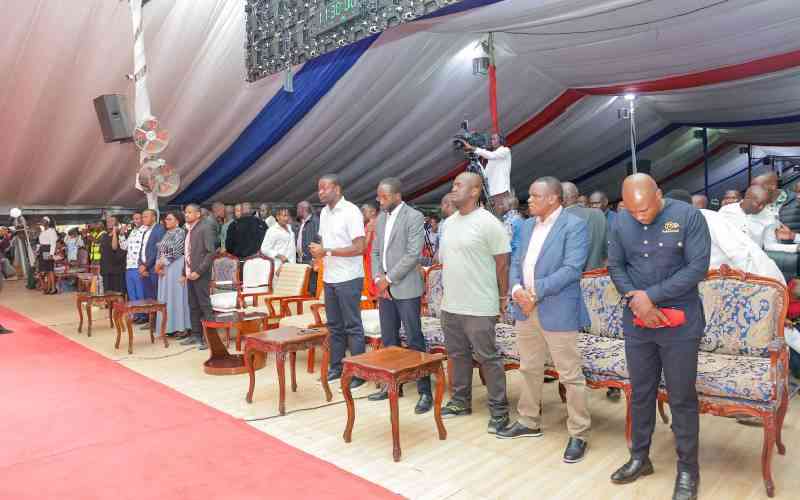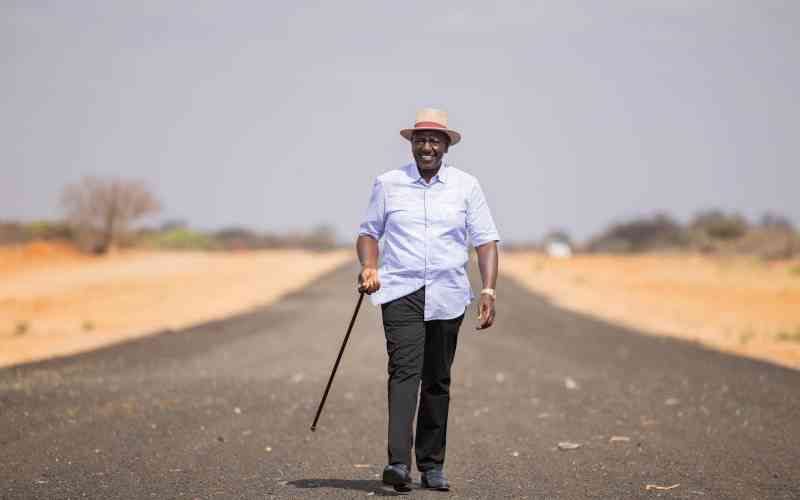Ruto Under Fire: President Accused of Bribing MPs in Explosive Graft Scandal!
)
President William Ruto has launched an intensified crackdown on corruption, issuing stark warnings to legislators and state officials implicated in bribery, a practice he referred to as "Soko Huru" (free market) within parliamentary committees. Speaking at a Kenya Kwanza-ODM joint parliamentary group meeting in Karen on Monday, August 18, 2025, President Ruto vowed decisive action, stating that those found to be involved in bribery would be arrested, not merely shamed. He condemned the pervasive corruption, arguing it was crippling the nation's progress and undermining Parliament's credibility.
The term "Soko Huru" describes a cynical marketplace where parliamentary committee decisions, legislative approvals, and oversight functions are allegedly for sale. President Ruto specifically questioned the role of "chairman of welfare" in committees, directly linking it to "extortion." To substantiate his claims, he cited alarming examples from intelligence, including an official allegedly raising Sh150 million to influence a Senate oversight decision and a committee collecting Sh10 million to pass an anti-money laundering law. He emphasized that these illicit funds rarely benefit the entire house but are pocketed by a few individuals.
In response to these allegations, President Ruto has formed a Multi-Agency Team (MAT) to spearhead Kenya's war on corruption. Chaired by the Executive Office of the President, this team brings together 11 key state institutions that traditionally work independently, including the Office of the Attorney General (secretary), National Intelligence Service (NIS), Ethics and Anti-Corruption Commission (EACC), Office of the Director of Public Prosecutions (ODPP), Directorate of Criminal Investigations (DCI), Financial Reporting Centre (FRC), Asset Recovery Agency (ARA), Kenya Revenue Authority (KRA), Central Bank of Kenya (CBK), and Public Procurement Regulatory Authority (PPRA). The MAT aims to boost collaboration, share intelligence, mobilize resources, develop public awareness campaigns, and work with international partners to trace and recover stolen assets. Ruto reiterated his "zero-tolerance" stance, declaring there would be "no sacred cows" in the fight against graft.
The President's accusations provoked a strong reaction from the Senate, with members expressing palpable anger and disappointment. On Tuesday, August 19, the Senate Accounts Committee, chaired by Homa Bay Senator Moses Kajwang', challenged House speakers to summon President Ruto to provide evidence for his allegations of extortion. Citing Article 125 of the Constitution, which empowers Parliament and its committees to summon any person for evidence, senators argued that no one, including the President, is exempt from accountability. Senators Edwin Sifuna and Samson Cherargei explicitly accused the Speakers of the National Assembly and Senate, Moses Wetangula and Amason Kingi, of failing to protect the image of Parliament and warned them of potential consequences if they did not defend the Houses.
The senators vigorously defended their oversight role, particularly against claims that they were extorting governors. During a committee session, Kitui Governor Julius Malombe appeared and stated he had never been asked for money by senators, nor had such complaints been raised at the Council of Governors (CoG). Senators also criticized opposition leader Raila Odinga for allegedly misadvising governors that the Senate should not summon them, with Senator Sifuna asserting that the Supreme Court had affirmed the Senate's right to oversight both equitable share and on-source revenue.
The political tensions also manifested in the National Assembly, where sittings failed to start and committee business was largely paralysed, signaling parliamentary disquiet over the President's remarks. Minority Leader Junet Mohamed criticized banks for demanding explanations for large withdrawals, insisting no law bars access to one's money, and challenged the Executive to bring any regulatory changes through Parliament. Rarieda MP Otiende Omollo also urged the Powers and Privileges Committee to summon President Ruto or other senior government officials to explain the bribery allegations.
Beyond the anti-corruption drive, President Ruto's address also encompassed his broader vision for national development, appealing for bipartisan support from both Kenya Kwanza and Azimio coalitions. He emphasized the aggressive implementation of the affordable housing program, presenting it as a bipartisan project aligned with both coalitions' manifestos, and highlighted its potential for job creation and urban transformation. In agriculture, he made a bold promise for Kenya to become a net exporter of sugar within two to three years, attributing this potential to unified political will. Furthermore, President Ruto announced a significant policy shift away from debt-financing for large infrastructure projects, with future mega-projects like the Mau Summit road and the Naivasha-Malaba standard gauge railway extension to be funded through Public-Private Partnerships (PPPs). He also stressed the importance of investing in youth, calling on MPs to utilize NG-CDF resources to establish ICT hubs in every constituency to create digital jobs and opportunities for graduates. The ongoing debate underscores a pivotal moment for Kenya as the government intensifies its fight against corruption while striving to unite political forces for national development.
You may also like...
From Etisalat to 9mobile to T2: The Rise, Retreat, and Reinvention of Nigeria’s Fourth Operator

From a meteoric rise to a challenging retreat, Etisalat Nigeria’s evolution into T2 tells a story of resilience, wins, a...
Boxing Blockbuster: Jake Paul and Gervonta Davis Set for November Showdown

In a surprising announcement, Jake Paul is set to face WBA lightweight champion Gervonta "Tank" Davis in an exhibition b...
Carabao Cup Shocker: Grimsby Stuns Man Utd in Penalty Thriller

Manchester United suffered a shocking Carabao Cup exit after losing 12-11 on penalties to League Two side Grimsby Town. ...
Venice Stunner: Paolo Sorrentino's 'La Grazia' Captivates Critics with Record-Breaking Ovation!

Paolo Sorrentino's new film “La Grazia” opened the Venice Film Festival to critical acclaim, presenting a nuanced portra...
The Hunt for 007: Frontrunners Out, Legends Back, New Details Emerge in Bond Saga!

The search for the next James Bond intensifies as actors like Taron Egerton and Glen Powell rule themselves out, while M...
Reading and Leeds Festival Plunged Into Chaos by Secret Set Leaks and Star's Last-Minute Snub

Reading and Leeds Festival 2025 is buzzing with fan speculation about secret sets from The Foo Fighters and Chase & Stat...
Naira Marley Breaks Silence on Mohbad's Death Amid Mounting Controversy

Musician Naira Marley has publicly addressed the controversial death of his former signee, Mohbad, sharing his side of t...
Pete Davidson's Paternal Bliss: Comedian's Dream of Fatherhood Comes True with Elsie Hewitt

Comedian Pete Davidson and model Elsie Hewitt are expecting their first child, announced via Instagram by Hewitt. Davids...


